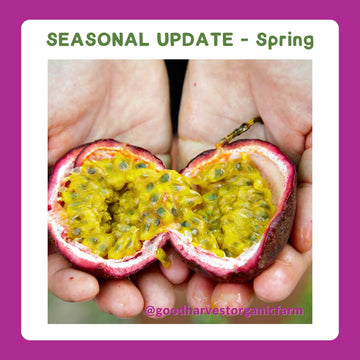We talk a lot in the organic industry about Seasonal Eating....but what does this really mean, and how does it translate to the foods you are consuming?
Before we dive into the myriad of reasons that seasonal eating can benefit you and your family, we first need to address the elephant in the room (so to speak).
Over the last few decades, our society has been conditioned into a way of consuming food that is almost the antithesis of seasonal eating.
With the advent of improved logistics for food, the increase in population density and development of the "supermarket", there have been some great advances in the way we source and consume food, but also some significant impacts on not only food quality, but our dietary intake and eating habits.
Seasonal eating really means just that. Eating foods that are in season. The ambiguity comes from the term - season. Our supermarkets are stocked daily with apples, oranges and a whole bunch of other fruit and veg that are available day in day out regardless of the time of year.
You can see why the term ‘season’ is hard to define, and how understanding when something is in season isn’t so clear. The other complexity is that organic produce seasons differ from conventionally grown produce seasons. This is because they use a whole bunch of chemicals and sprays to extend the growing season of conventional produce.
So why eat seasonally anyway?
Nutritional Impacts
Food that has been picked, transported and stored out of "season" is usually lower in nutritional value than its local seasonal counterpart due to the delay in time between harvest and consumption. Most often the produce loses its nutritional content due respiration, oxidation and dehydration. Produce loses water content after harvesting (you've all at least once found the dried-up fruit or veg hiding at the back of the fridge!), which in turn means loss of vitamins such as Vitamin C, Vitamin B and folate.
When eat seasonal produce that has been grown locally, we are inherently consuming this not long after harvest. This is often why produce grown at home not only tastes better, but makes you feel good (it might be the validation of growing something as well, but the nutrients are also at their peak!).
At certain times of year our bodies also respond to the nutrients in seasonally available foods. This is why we tend towards light salads and fruit more in summer, and soups and warming foods in winter.
Shelf Life
I'm still amazed at the capacity of my fridge to keep things fresh! Produce sourced direct or closer to home will often last longer in the fridge which means way less wastage. It's not uncommon to get 1-2 weeks of shelf life from a bag of spinach or our salad mix. We recommend eating it sooner but it's nice to know that the harvest to plate time is shortest - in some cases less than 24 hours!
Produce sourced out of season and from supermarkets is generally 1-2 weeks old by the time it arrives which means less time for you to eat it and more wastage.
Supporting local growers
When we eat seasonally, our support stays more local. That means instead of giving your support to wholesalers or supermarkets who then pay less to the farmer, you’re often directly supporting the grower
How do I know it's in season?
There'll be a few tell-tale signs that something is in season.....
- There'll be a fairly decent supply (although this can vary due to climate conditions especially this year!)
- It'll be reasonably priced
- It'll be fresher
The benefit of living in a smaller country is that we have distinct growing regions across the year, that are still accessible within a day of travel. It means that we can eat seasonally, and also access produce nearby that is in season.
We work with a whole bunch of awesome farmers locally and through South-Eastern Qld, NSW and down to Victoria. We have a win-win partnership which means when we have lots of produce, we send it down south, and conversely, when they are abundant, they send some to us 💚
If a product isn't available either online or at our markets, it means that it's out of season or the price is too prohibitive (low supply or coming from too far away).
Staying up to date with what’s in season can be tricky! When you combine all of these factors it’s hard to know when something will be available. We’re working on ways to help make it clearer for you to determine seasonal availability! Over the coming months we will be developing some super cool seasonal guides and updating our site with seasonal info.
Of course, if you’re ever not sure about when something is in season, simply ask us!




